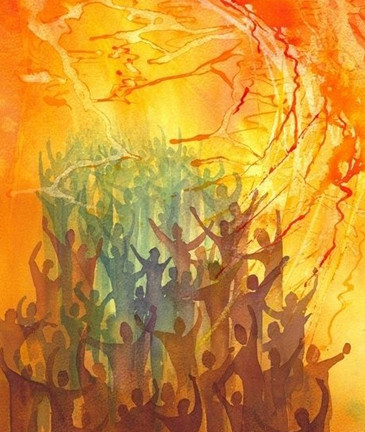The readings for the feast of Pentecost present us with two different perspectives of the Spirit event. They aren’t meant to be reconciled, but rather offer different theological insights about how the early Christian community experienced this life-changing gift of the Spirit to the early church.
 For Luke in the Acts of the Apostles, the Spirit’s arrival is exuberant. The Spirit seems to explode out all over the place with the tongues of fire and the sound of a strong driving wind. Pentecost celebrates the special permanent union between God and the church and it is not reserved to only a special few. The Spirit comes to rest “on each of them.” All were gathered and each receives the gift – leaders and ordinary folks as well. This is a new kind of community, showing new life and a new kind unity shared with one another. Even the crowd outside gets special favors as “each one heard” the disciples speaking to them “in his/her own language.”
For Luke in the Acts of the Apostles, the Spirit’s arrival is exuberant. The Spirit seems to explode out all over the place with the tongues of fire and the sound of a strong driving wind. Pentecost celebrates the special permanent union between God and the church and it is not reserved to only a special few. The Spirit comes to rest “on each of them.” All were gathered and each receives the gift – leaders and ordinary folks as well. This is a new kind of community, showing new life and a new kind unity shared with one another. Even the crowd outside gets special favors as “each one heard” the disciples speaking to them “in his/her own language.”
But the Spirit doesn’t always work with such spectacular special effects. In fact, we don’t often, if ever, experience such displays. Some never see such signs that clearly indicate the creative force of God at work. Maybe that’s why we have John’s account of the giving of the Spirit.
There is definitely a quieter tone in John’s account of the gathering of the disciples. They are afraid as they think about the hostile world outside their little group and the absence of their usual supportive Jesus. But suddenly he is among them and breathes on them and wishes them his peace. And this reassurance of peace must have been consoling to them. If the Risen Lord could forgive and forget their transgressions and betrayals, then his Spirit will enable them to do the same for others.
This Spirit, whether in Luke’s interpretation or John’s, touches a common theme. The Spirit is here and now.
The Spirit we celebrate today is the Spirit of the risen Christ for whom closed doors are not an impassable barrier, nor are they part of a fortress to keep us in. The Christian community has always been seen as the Spirit-guided bearer of the Word of Salvation. Easter/Pentecost happens now. It is the continuing invitation from our God to an ongoing, ever new encounter with Him and with others.
St. Paul tells: "As a body is one though it has many parts, and all the parts of the body, though many, are one body, so also Christ. For in one Spirit we were all baptized into one body, whether Jews or Greeks, slaves or free persons, and we were all given to drink of one Spirit." (1 Cor 12:3b-7, 12-13) Who we are and what we are is less important than what we are called to do. Jesus has breathed His Spirit into each of us and we each are part of the community of God's people, a community that is ever-changing, ever-diverse and ever-growing.
John XXIII once said that "we are not here to guard a museum, but to cultivate a flourishing garden of life." The Holy Spirit is the gardener who has planted the seeds. It is up to us to bring the harvest of that garden to fruition.





